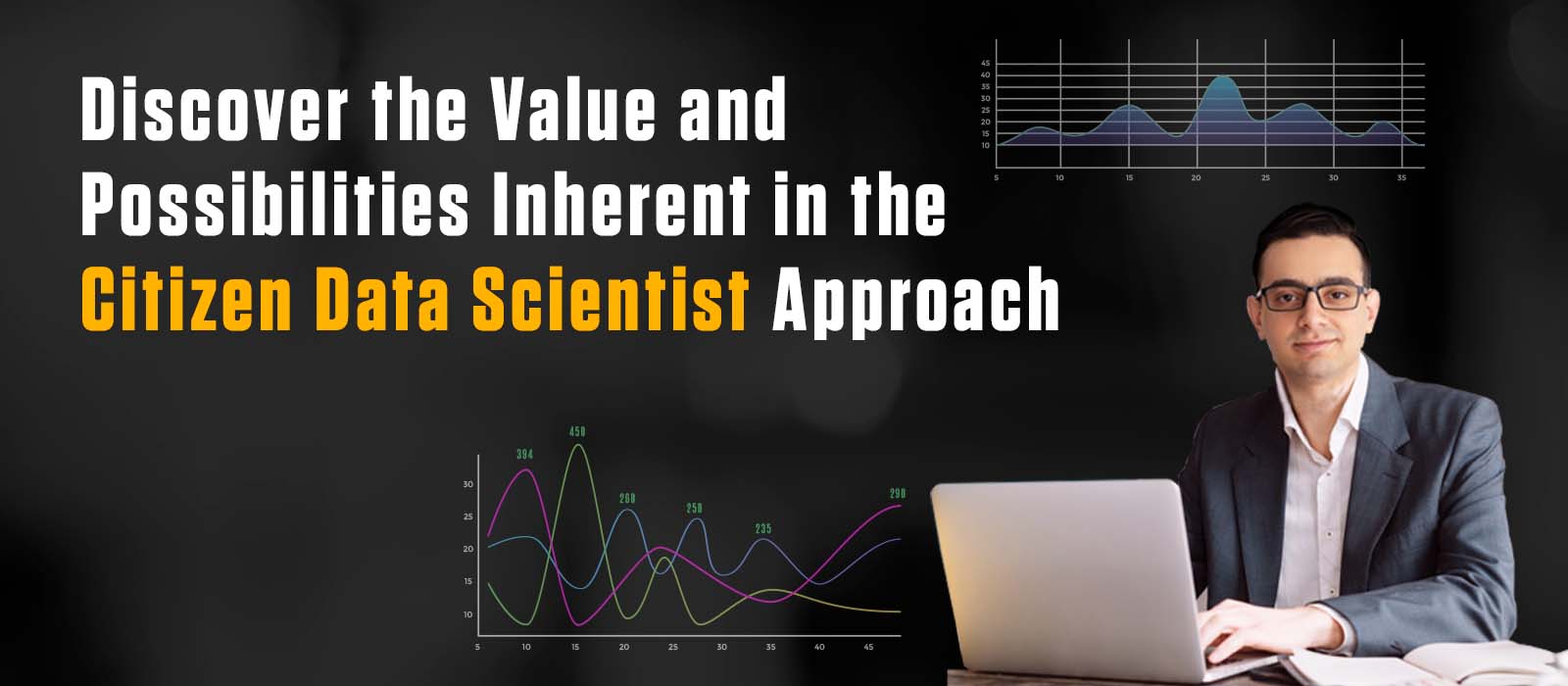What is a Citizen Data Scientist, What is Their Role, What are the Benefits of Citizen Data Scientists…and More!
The term, ‘Citizen Data Scientist’ has been around for a number of years. In fact, the world-renowned technology research firm, Gartner, first introduced the concept in 2016. Since then, the idea has grown in popularity. If you are reading this article, it is probably because you a) want to know more about the concept, b) understand the concept and would like to know if your business can leverage this approach to improve its market position and customer visibility, or c) have embraced the Citizen Data Scientist approach and are looking for ways to expand and refine the concept within your own business environment.
Whatever your reasons for taking the time to read this article, it is notable that you have decided you want to know more. So, let’s get started.
What is a Citizen Data Scientist?
Gartner defines a citizen data scientist as, ‘ a person who creates or generates models that leverage predictive or prescriptive analytics, but whose primary job function is outside of the field of statistics and analytics.’
Who is a Citizen Data Scientist? The role of a citizen data scientist is played by a business user or team member within the organization. The typical profile of an ideal Citizen Data Scientist is a person who is respected within the organization, and often shares data and information with other users to collaborate and produce outcomes that are designed to achieve goals and objectives and produce a successful outcome. These individuals may already be ‘power users’ of business applications and may have developed and reported or presented data to others with an eye toward clarifying their decision-making. Citizen Data Scientist candidates may also be IT team members who are interested in data science. In any case, these candidates will typically be uniquely curious, interested in data analytics and devoted to fact-based decisions and team collaboration.
If a business provides its users with tools that are easy to learn, and a clear path to complete their transition to Citizen Data Scientist, they are more likely to embrace the concept and support the initiative, and your business will achieve the goals it has established.
Who are Citizen Data Scientists within your own organization? You will know them by their willingness to learn new things, and to advance their own visibility and their own careers by using new skills to improve results within your organization. What are Citizen Analysts? They are team members who are not IT professionals, data scientists or business analysts but are willing and able to leverage analytics and data science tools to solve business problems.
Here are just a few of Gartner’s predictions related to the Citizen Data Scientist evolution and its importance:
- in the future ‘…40% of data science tasks will be automated, resulting in increased productivity and broader usage by citizen data scientists.’
- a ‘scarcity of data scientists will no longer hinder the adoption of data science and machine learning in organizations.’
- ‘Early adopters of augmented analytics have the potential to realize more strategic and differentiating business benefits from their analytics investments than those who wait until these technologies are widely adopted.’
- ‘…automation of data science tasks will enable citizen data scientists to produce a higher volume of advanced analysis, than specialized data scientists.’
- ‘…the number of citizen data scientists will grow five times faster than the number of expert data scientists.’
- ‘…citizen data scientists will surpass data scientists in the amount of advanced analysis produced.’
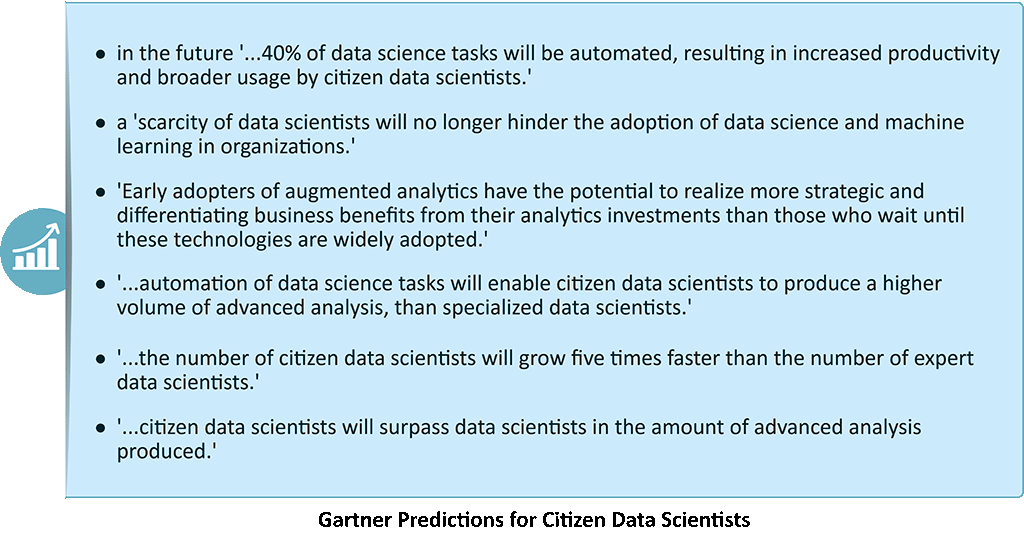
How Has the Concept of Citizen Data Scientists Evolved?
It took a while for the global business community to embrace the concept of Citizen Data Scientists and, even today, there are those naysayers who believe that the only correct approach to analytics is by using Data Scientists or business analysts or engaging the internal IT team to create reports and provide analytics for decision-making.
But the race to compete and the complexities and rapid rate of change have forced businesses to look for alternatives and the Citizen Data Scientist role has become more popular as those leading the charge prove the value of the role to the organization and to the business users, data scientists and IT professionals.
The role of the Citizen Data Scientist began as a simple augmentation to gather data and create reports for daily use but Interest In The Role Has Tripled Over The Past Decade, and the responsibilities and visibility of the Citizen Data Scientist have evolved.
Much of the evolution and the potential of the role has been driven by the evolution of business intelligence (BI) tools and the introduction of augmented analytics and solutions that employ natural language processing (NLP) and machine learning to enable those with average technical skills to gather and analyze data and produce results for clear insight, using sophisticated tools that are designed to be simple enough for the average business user to understand.
As team members perform these tasks, share data and collaborate, the business can engender data democratization and improve data literacy across the enterprise.
To fulfill the role of a Citizen Data Scientist, business users today can leverage augmented analytics solutions; that is analytics that provide simple recommendations and suggestions to help users easily choose visualization and predictive analytics techniques from within the analytical tool without the need for expert analytical skills.
When a Citizen Data Scientist uses these tools, the resulting analysis can be combined with the professional knowledge and specific domain skills of the individual to better understand and gain insight into trends, patterns, issues and opportunities and improve time to market, accuracy of predictions, and metrics and measurements.
Adopting these tools and techniques and actively engaging in augmented analytics allows the Citizen Data Scientist to more effectively interact with and collaborate with the IT team and data scientists to prepare data and use data in use cases, and to refine outcomes and improve data-driven decision making across the enterprise.
One of the most important lessons learned in the past decade is that the Citizen Data Scientist role can be rewarding to the organization and to the business user. But to succeed, the enterprise must plan carefully. It must understand how to use Citizen Data Scientists and create an environment that allows for this transition. Selecting a business intelligence or augmented analytics tool and deploying that tool does not, in and of itself, solve your problems. You must plan for the cultural shift and ensure that the business users have the support they need to transition into the citizen data scientist role.
The typical job recruiting site does not feature Citizen Data Scientist roles or job description. If you want to understand how to become a citizen data scientist, you have to focus first on the knowledge, training and roles and responsibilities of the team member core position. What is their unique contribution? What is their job? To this foundation, your business will add the citizen data scientist role, and enable the team member to use analytics to add value to their output and recommendations and to make decisions that are based on objective metrics and analytics.
The Importance of Citizen Data Scientists
Citizen Data Science has become popular around the world. Many researchers use citizen scientists to perform analytics and gather information that becomes the foundation to train artificial intelligence (AI) models and to look for trends, patterns and information that will help us to solve climate issues, discover possible treatments for disease, design new and better cities, etc. Likewise, businesses are discovering the importance and the value of using Citizen Data Scientists within the organization to collaborate and share data and to learn from each other and from the patterns, trends and insights data can provide and use that insight to solve problems and to identify opportunities.
The Importance of Citizen Data Scientists has become a focus for the wise business executive and manager. Understanding Citizen Data Scientists and how they can supplement analytics and help the organization to be more successful, can be a real competitive advantage for a business, whether that business is in a local market, a global industry, a vertical niche or a broad corporate footprint.
The Benefits of Citizen Data Scientists
There are many benefits inherent in the Citizen Data Scientist approach. Empowering Citizen Data Scientists with appropriate tools, software solutions and management and cultural support is necessary to achieve these benefits. In the section entitled, ‘Preparing for a Citizen Data Scientist Initiative’ below, we discuss the factors, considerations and crucial components of a successful Citizen Data Scientist program.
Here, we will focus on the Benefits Of Citizen Data Scientists, assuming a well-conceived program. These benefits assume the identification and selection of an appropriate augmented analytics solution to support business users and the business organization.
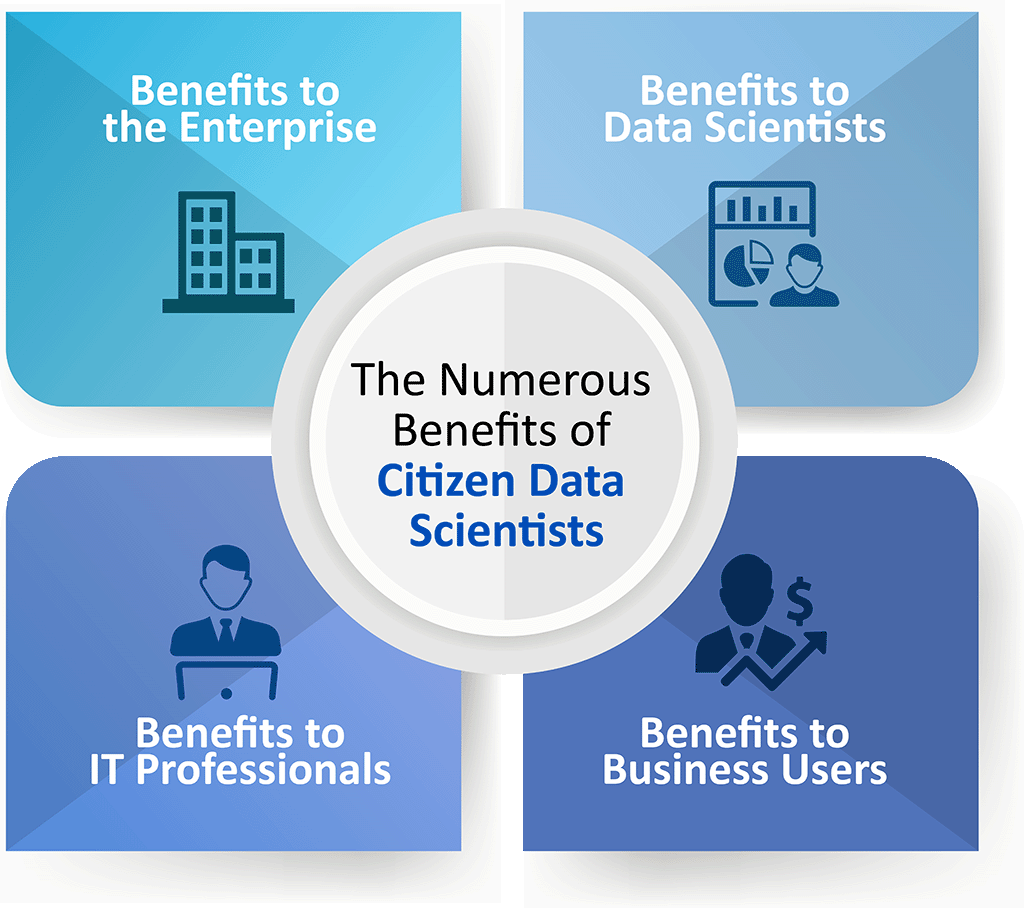
Benefits to the Enterprise
- Turning business users into Citizen Data Scientists can have many benefits for the business organization.
- Allows the organization to improve data democratization and leverage all-important data to make objective decisions
- Creates a metrics-based decision-making process that is measurable and can be easily adapted and managed
- Improves the value of team member contribution
- Optimizes professionals skills of data scientists and IT professionals and allows them to focus on strategic and operational tasks and goals
- Improves Competitive Advantage by optimizing resources, skills, knowledge and data
- Allows the organization to be agile and to adapt quickly to the market and to changing customer behavior
- Identifies challenges and issues before they become a real problem
- Identifies opportunities for growth and customer engagement
Benefits to Data Scientists
- Allows Data Scientists to focus on strategic initiatives, rather than constantly responding to business user requests
- Allows Data Scientists to collaborate and engage with business users in a meaningful way to build teams and expand knowledge and understanding of the business
- Creates the foundation for additional tools and techniques that can be leveraged by Data Scientists with advanced skills
Benefits to IT Professionals
- Enables IT professionals to focus on day-to-day and strategic objectives and tasks without having to respond to business user requests for reports and information from data repositories
- Provides additional data governance and the ability to monitor and track ‘popular’ data and reports and to create environs that offer users and data scientists the right support
- Allows IT professionals to collaborate with business users and data scientists to better support the organization and to identify opportunities for their own growth and potential
Benefits to Business Users
- Builds an understanding of data in a way that is meaningful to a business user role and responsibilities
- Supports fact-based decision-making and alleviates issues resulting from decisions made by guesswork and opinion
- Allows users to easily integrate and gather data for analytics and to leverage sophisticated tools in an intuitive environment
- Improves business user data literacy and data democratization providing information that is crucial to team members and to the successful completion of tasks and workflow
- Supports day-to-day analytics and allows business users to make clear, concise recommendations and suggestions to improve outcomes
- Allows business users to collaborate with data scientists and It professionals for refinement of analytics to take data insight to the next level for strategic decisions
- Enables career advancement and expands knowledge, team visibility and success
- Ensures that all team members within the enterprise have the right information to do their jobs and to support organizational goals and objectives
The Risks Of Empowering Citizen Data Scientists are often discussed in industry publications, so it is important to mention this side of the argument. Citizen Data Scientist pros and cons typically fall into these general categories:
- Business Users should not be given access to data because of security or data governance concerns
Note: The right augmented analytics tools and solutions will provide multi-layered security and allow IT to create appropriate access to data and ensure the security and privacy of the data the executive management team wishes to isolate or guard. - Analytics is not appropriate for business users because they can’t understand the data or reports and may use the data in appropriately
Note: While every business users may not need to use data analytics every day, many will. Roles and responsibilities will dictate this need and, with the right solution, even users with average technology skills can gather and create analytics that are easy to understand and will guide the team to clear, concise results and decisions. - The use of analytics in the general business community is not necessary and does not provide value
Note: There is ample research to illustrate the value of an educated team, and the more information your team has to make the right decision, the less rework and missteps the organization will experience. Think of your team as an army. Everyone has to know what direction they are headed, and have the information they need to get the job done, or your success will be at risk. Provide the support your team needs to learn the new approach and trust them to apply their market, industry and functional knowledge to analytics to achieve the best outcome and the clearest decisions. - The cost of providing analytics to business users is too high and is not supported by the value it provides
Note: The right augmented analytics solution does not have to be expensive, or difficult to implement or learn. Assess your current situation and your needs and choose a solution that will support your team and your budget and schedule. It IS possible and it will provide numerous benefits and add value far beyond the cost of the solution.
Turning Business Users Into Citizen Data Scientists is a process that should not be taken lightly – but that doesn’t mean it is impossible or even daunting. It simply means you must prepare and, like any other shift within your organization, you must adapt your culture, your technology, your business processes and your workflow.
‘ Who are Citizen Data Scientists within your own organization? They are team members who are not IT professionals, data scientists or business analysts but are willing and able to leverage analytics and data science tools to solve business problems.’
Preparing for a Citizen Data Scientist Initiative
Once you have made the decision to begin a Citizen Data Scientist initiative, you must plan carefully to be sure you can accomplish your goals.
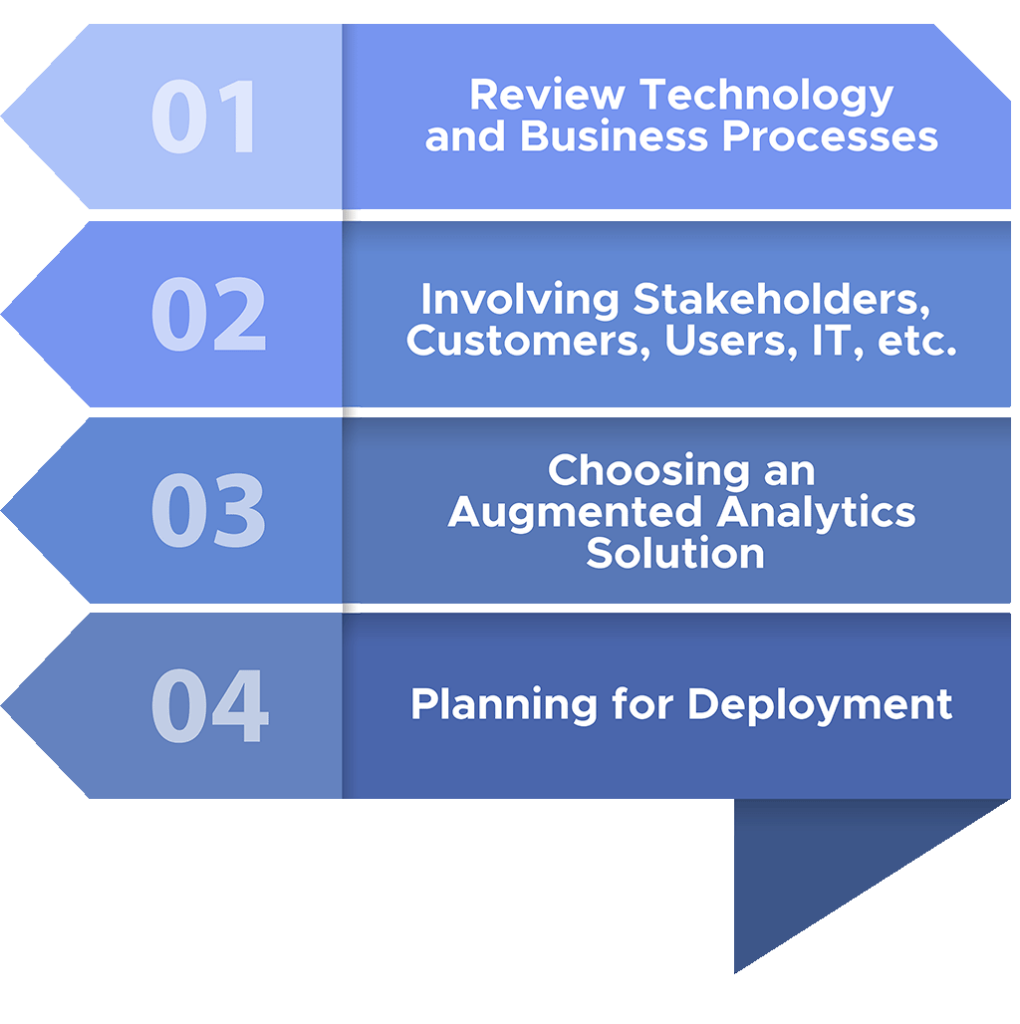
Review Technology and Business Processes
Look at your current technology and all the places your data resides (data warehouses, the cloud (private or public), best-of-breed software, legacy software, ERP, CRM, HR, SCM, and other focused solutions that support a particular division, team or department. You will want to integrate data from all possible sources in order to give your users the information they need to perform analytics.
Work with your IT team, and (if you have already chosen an IT consultant) with your advisors to analyze the technology and infrastructure and establish a plan of attack. Consider the network, hardware and software, and decide whether you will want Embedded BI within any popular software solution to allow users to leverage a single sign-on environment to access data and analyze it all in one place.
Review business processes, workflow, approval loops etc., and see where you can gain advantage by including analytics and technology to improve productivity and the quality and speed of decisions.
Involving Stakeholders, Customers, Users, IT, etc.
Management and/or IT cannot plan for and execute this type of change alone. You will need to understand how cascading analytics throughout the organization will impact your users, your customers and others. Establish a team that includes representatives from the various functions, levels and areas within the enterprise.
Listen to their concerns and address those concerns with an appropriate plan for deployment, training, ongoing support, etc. Otherwise, you are unlikely to succeed. User adoption is important but you can also use this time to identify and highlight those areas where you can find opportunities and thereby improve the success metrics and outcomes you hope to achieve.
Choosing an Augmented Analytics Solution
Choosing the right augmented analytics and business intelligence (BI) solution will drive success of a Citizen Data Scientist initiative. These solutions are key to helping you achieve your goals and to supporting your business users as they make the transition to Citizen Data Scientists. Look for a full suite of features and functionality to support your users, as defined in the section below, entitled, ‘Engaging IT Consulting Experts and Choosing a Solution.’
Planning for Deployment
Will you deploy the augmented analytics solution across the entire enterprise at once, or will you roll it out by division, department, location, etc.? Who will be in charge of the deployment? Your team should include representatives from the various groups that have a vested interest in the outcome. When you choose an IT consultant, they can help you plan for and execute your strategy so that it is successful and you are not overwhelmed.
Depending on the solution you choose, you will have to consider Citizen Data Scientist Training. While there are citizen data scientist certification courses, if you choose the right augmented analytics solution you are not likely to need this type of training but, rather a simple introduction that will explain the new role, how to work with and collaborate with data scientists and IT and how to use the augmented analytics solution to get the information the business user needs in a way that is meaningful to them.
Engaging IT Consulting Experts and Choosing a Solution
If you are planning a Citizen Data Scientist initiative, it is wise to choose an IT consulting partner. You don’t have to go it alone! The right partner can help you with strategies and walk you through the process to build a new foundation and to support your future growth and adapt to changing market environs.
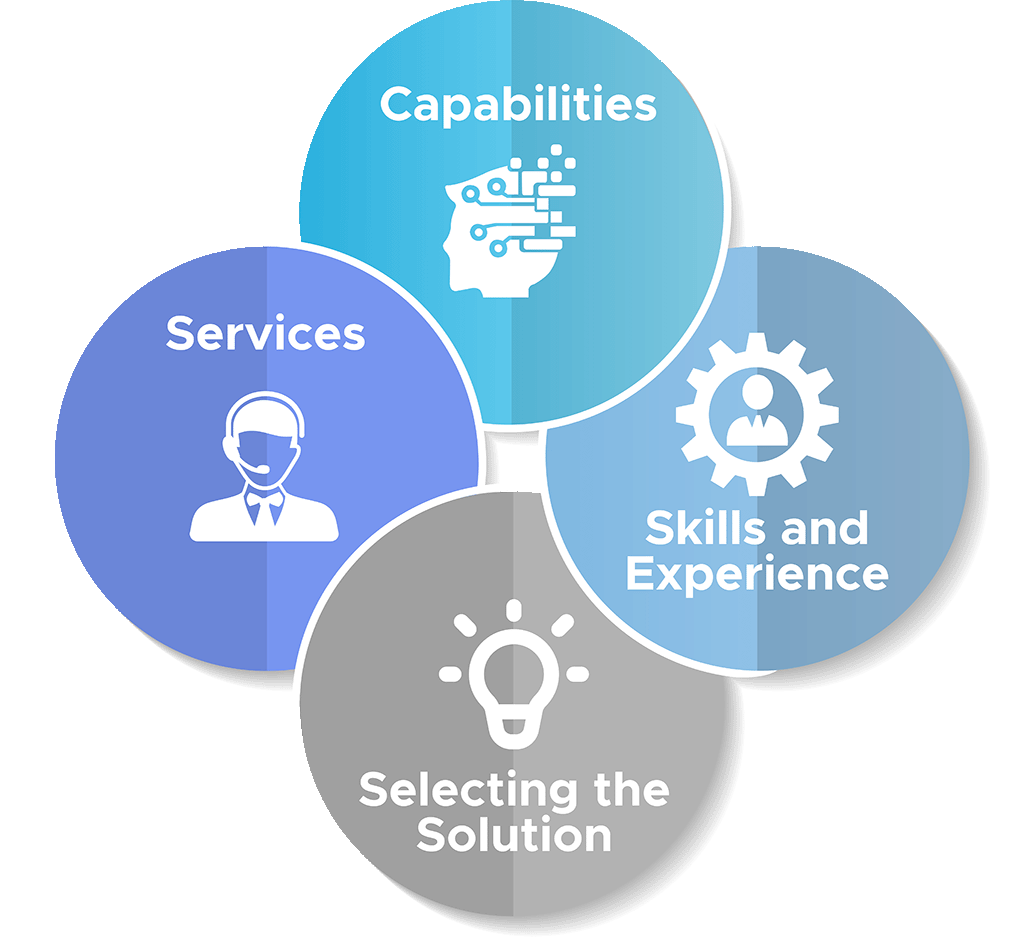
Capabilities
Choose an IT consultant that can provide data science, analytics, technology, and soft leadership skills to ensure that your project is well staffed, and that you have what you need 24/7. The right IT consultant will have a plan to keep the augmented analytics products evergreen and grow with the field of technology and innovation.
Services
Choose an IT consultant that can help you plan and implement your Citizen Data Scientist initiative with workshops, webinars, and other resources designed to jump start data democratization, help you achieve appropriate data governance and do it all with minimal training and time investment. Services should include onsite, offsite or hybrid delivery, requirements planning, project management, architecture and data management, data science support, business user support, training.
Skills and Experience
Be sure the IT consultant you choose has a wealth of experience and references and a proven track record. Compare their services, fees and staffing capabilities to other vendors and consultants and choose wisely. You will want an IT consultant that can:
- Encourage Collaboration
- Engender Accountability
- Improve user adoption, improve Business Intelligence ROI and overall organizational value
- Improve Data Literacy
- Increase Fact-Based Decision-Making
- Optimize IT, Data Scientist and Business User resources
- Transform Business Users into Citizen Data Scientists!
- Provide Mobile Access for Business Users – Anytime, Anywhere!
- Support rapid implementation and deployment
Selecting the Right Augmented Analytics Solution
Not all augmented analytics solutions are equal! Be sure the solution you choose has all the features you need and will be easy for your users to learn and adopt. Look for a comprehensive solution suite that includes:
The right augmented analytics solution can make or break your Citizen Data Scientist program. Your users do not want a solution that is hard to learn or takes too much time. They want something that will support their needs and make their job easier – a solution that will give them clear, concise data without the need for advanced skills or knowledge. If you provide them with tools that are easy to learn, and a clear path to complete their transition to Citizen Data Scientist, they are more likely to embrace the concept and support the initiative, and your business will achieve the goals it has established.
This article provides a significant foundation for understanding Citizen Data Scientists and how Augmented Analytics can help your business users make the transition to the new role to help you achieve your goals, and improve data democratization and data literacy.
Contact Us to find out how augmented analytics Technology can support your enterprise, and ensure analytical clarity and results. Discover the next level of Self-Serve Analytics and explore online Citizen Data Scientist Training and the features and modules of a seamless, sophisticated, easy-to-use augmented analytics solution to see how your business can use analytics to achieve its goals.


